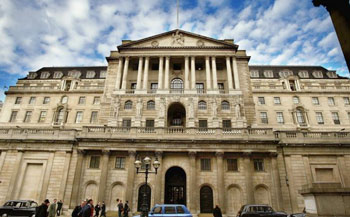Emergency
London
banks tap into emergency loans fund
Bank of England lends £314m ahead of urgent talks between three of America's most powerful financial figures on market turmoil
 The Bank of England has, for the first time in more than a month, granted access to a back-up loan facility to help banks see their way through current market unease.
The Bank of England has, for the first time in more than a month, granted access to a back-up loan facility to help banks see their way through current market unease.
The Bank said it had lent £314 million through its "standing facility", which allows banks to borrow unlimited funds overnight, albeit at a penalty rate.
The facility is made available to just under 60 banks to provide support to members when they are having liquidity problems or where a technical glitch might make lending from another bank impossible.
Banks normally borrow short-term funds from other banks. However, the current market turbulence has made banks more reluctant to lend.
Banks which borrow from the facility pay interest at 1 percentage point above the current Bank of England base rate.
The facility was last used in July, when £109 million was lent. At the end of June the Bank made overnight loans worth £4 billion in one day.
The news came as China increased its base lending interest rate by 0.18 percentage points to 7.02 per cent, and its deposit interest rate by 0.27 points to 2.6 per cent.
That move came ahead of a meeting today between three of America's most powerful financial leaders to discuss the US sub-prime credit crisis and market turmoil which prompted a surprise half-point cut in the Federal Reserve's discount rate on Friday.
The meeting has been called by Christopher Dodd, chairman of the US senate committee on banking, housing and urban affairs, and will be attended by Treasury Secretary Henry Paulson and Federal Reserve chairman Ben Bernanke.
The three will discuss "the broader implications for the US economy, as well as possible additional steps that can be taken to help stabilise mortgage and financial markets and help homeowners nationwide."
Stephen Roach, chairman of Morgan Stanley's Asian operation and the bank's former chief economist, yesterday accused the central banks of being "asleep at the switch" in managing their respective economies in the run up to the current global credit crunch.
Mr Roach likened the US sub-prime mortgage market collapse to the dot-com bubble implosion in 2001. "As always, the cycle of risk and greed went to excess. Just as dot-com was the canary in the coal mine seven years ago, sub-prime was the warning shot this time."
Last week, the Federal Reserve reduced the rate at which it lends to banks from 6.25 to 5.75 per cent but left broader interest rates unchanged at 5.75 per cent.
Just before the Fed made its move, Mr Paulson told The Wall Street Journal that the plummeting value of equities, sparked by the crisis in the US sub-prime mortgage market, “will extract a penalty on the growth rate” of the US economy. But he added that “the economy and the markets are strong enough to absorb the losses” without tipping the world’s largest economy into recession.
Senator Dodd, a democrat, has been virulent in his criticism of the US government's handling of America's current financial problems. Last week, he said: "People all across America are hurting because of serious and on-going problems in our housing markets.
"The Administration can’t continue to close its eyes to the scope of the problem and hope it goes away. This problem isn’t ‘contained’ as the Administration contends."
Last week, the Fed's move reversed 200-point falls in London and New York and reassured Asian investors enough for Tokyo to have clawed back more than 70 per cent of last week's decline.
But markets remain fragile. London attempted a 40-point climb in first dealings today, but this was cut within minutes and the FTSE 100 was trading down 13 points at midday, reversing most of yesterday's gains.
(Published by Times Online, August 21, 2007)
_________________________